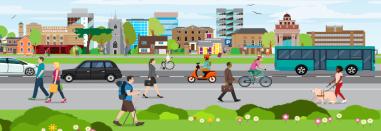Nature and Ecological Restoration
Water Scarcity
Water will increasingly become an issue, as weather patterns change, both through drought and heavier rainfall. This will have knock-on effects for our chalk or chalk-fed rivers, which are fed by groundwater. Watford is in a low rainfall area, and so is already under water stress.
In addition, water is abstracted from the groundwater to supply homes and businesses in Watford, which also reduced the flow of the river and impacts on ecosystems and biodiversity. Watford has one of the poorest records of water conservation in the country. In Hertfordshire, we use, on average, 150 litres/person/day (l/p/d) compared with a national average of 14 l/p/d. And even then, the UK is one of the highest users in Europe. New homes can be designed to achieve around 80 l/p/d, and Watford's new local plan requires 110 l/p/d or less.
Reducing our water usage not only reduces the impact on our local watercourses and biodiversity, it also reduces our GHG emissions, due to the energy required to treat the water pre- and post-use, and potentially reduces the cost.
Heavier rainfall will have the potential to create flash floods especially after a prolonger period of dry weather, and not always where they have historically been. If road drainage systems can't cope, then more flodding is likely to occur. To address these risks, more natural rainwater management systems need to be considered, such as ponds of swales. These allow water to collect and then seep through the ground. Where this is not possible, other systems which allow water to slowly seep into the ground rather than discharge into the seweragge system need to be considered. Rainwater collection for use in gardens, homes and businesses will be looked at.


